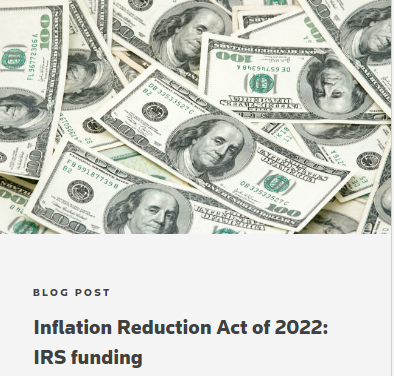It happened. The Inflation Reduction Act passed. Now the attention turns to what the Act could mean for taxpayers and what value-add opportunities it presents for tax and accounting firms.
Jump to:
| Background on the Inflation Reduction Act |
| IRS ramps up hiring |
| Using energy tax credits as value-add opportunities |
| Be relevant |
| Stay up-to date |
In a recent Pulse of the Practice episode, Mo Arbas, a consultant for Thomson Reuters Tax and Accounting, and Paul Miller, founder and owner of Business By Design in Minneapolis, Minn., had a timely discussion about the Inflation Reduction Act. They talked about some of the key provisions in the bill and the opportunities they can present for firms.
Background on the Inflation Reduction Act
In August 2022, President Joe Biden signed the Inflation Reduction Act, which is essentially a scaled-down version of the Build Back Better Act proposed by the Biden administration in 2021. Designed to reduce the deficit and lower inflation, the Act sets in motion a range of tax law changes and provisions that are sparking much discussion.
“There’s a slew of things that are happening with this Act. I mean, we’re talking about investment in climate, some energy policies, health insurance, and drug reform. But there are a couple of things that got people talking when I was at Partner Summit,” Arbas said.
Miller agreed and said, “At a high level, a lot of the discussion we had at this time last year, talking about potential changes, most of that’s not in play. There’s a scaled-down, a much more scaled-down version, but yet there are still things that are having an impact for, what I would say, the average person and the conversation they have.”
IRS ramps up hiring
Among the provisions getting the most attention is the roughly $79 billion in additional funding it provides the IRS over 10 years. It’s how the money will be spent that is raising eyebrows.
The funding will be parcelled out across four main categories, including enforcement. The remaining areas are taxpayer service, operations support, and business system modernization.
While some of that money ($45.6 billion, according to the nonpartisan Congressional Research Service) will go toward ramping up enforcement, the IRS maintains that it is not about increasing audit activity.
Some, however, may not be so convinced as the IRS looks to reduce the “tax gap.” What is clear is that this represents an opportunity for firms to be proactive and further strengthen their role as a trusted advisor.
“So, we don’t really know yet what these jobs really are, but to get people trained up and understand what the motive is and how returns are scored and what are they looking for, I think a lot of that is going to be more software related. I think they’ll probably end up hiring people that are technology driven and using more software to kind of spot check stuff,” said Miller. “But more important … I think it’s a good opportunity to use that news story to reinforce to your clients, Hey, there could be trouble coming. If you don’t have your act together, you better start getting it together.”
Using energy tax credits as value-add opportunities
There are also several energy-related provisions within the bill, such as tax rebates and credits for households to lower energy costs, as well as tax credits, loans, and grants to boost the domestic production of solar panels, wind turbines, etc.
This too can represent planning and value-added opportunities for firms.
“If we start talking about residential energy credits or electric vehicles or some of these other things, there’s money laying there for people to start thinking about strategically for themselves,” said Miller. “… And so when you think about whether you have investment property clients or whether it’s, again, residential clients, what they can do for some of these energy credits, there’s some decent money laying out there and some planning opportunities at least to have that conversation.”
Be relevant
Accountants often feel as though they need to have all of the answers. They don’t. What’s important is being relevant.
Developments, such as the passage of the Inflation Reduction Act, present a value-add opportunity to proactively communicate with clients in a one-to-many format (i.e., a short video, PowerPoint, webinar, etc.). Let them know what you know, and update the messaging as needed.
Said Miller, “I just think that the accounting industry as a whole needs to start being more relevant than right on certain topics when these changes come. We can’t just sit back and wait for all the details sometimes. Sometimes we just have to be able to explain to people what we know. And as new information shows up or new examples show up, or court cases show up, then we pivot and change if we need to.”
Noted Arbas, “I feel there’s going to be a lot coming and I feel we’re probably going to spend maybe a couple of more episodes talking about this as we learn more.
Stay up-to date
The new Inflation Reduction Act will have far-reaching implications for taxpayers and tax professionals. As we move forward, it will be important to keep a close eye on key provisions in the bill and how they can be leveraged to create value-added opportunities for firms.
If you are looking to stay up to date on the accounting industry, listen to the full “Inflation Reduction Act” episode of the Pulse of the Podcast or on your preferred platform (Apple, Spotify, Stitcher)
Blog postUnderstanding the Inflation Reduction Act of 2022
|
 |
Podcast page
|
 |






